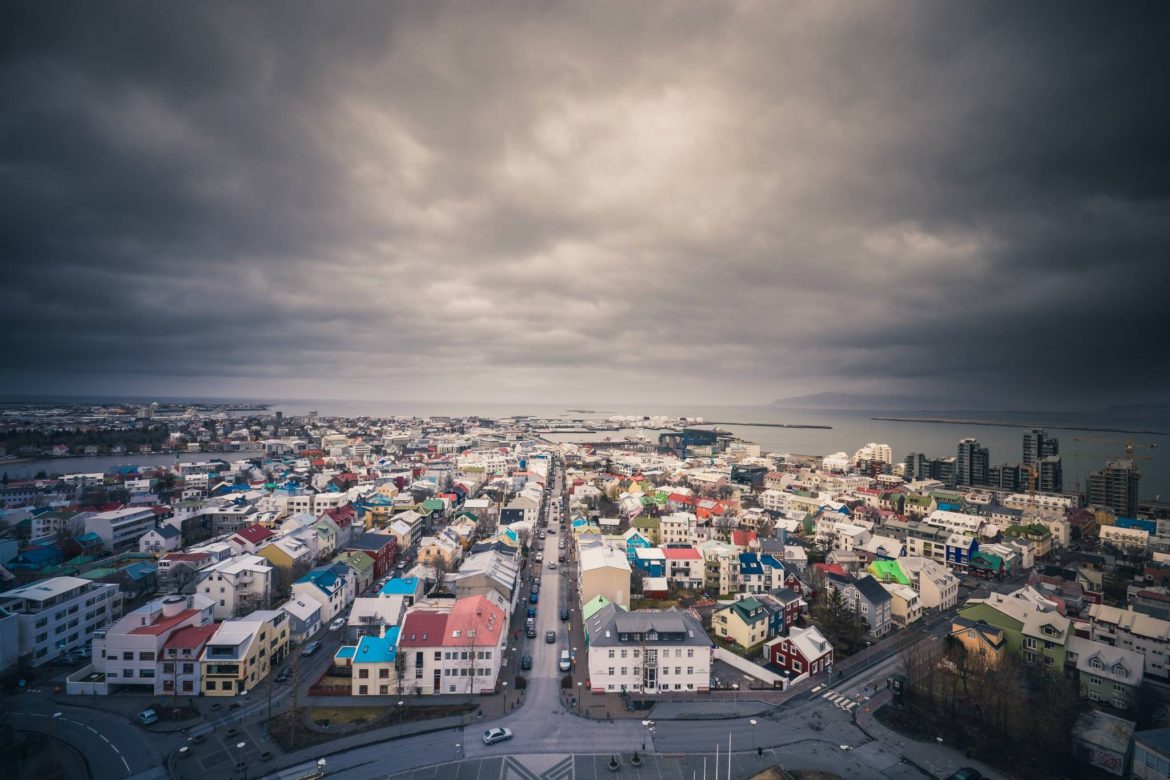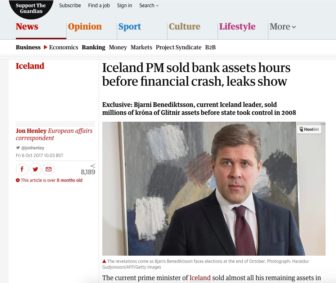
Stormy Skies Over Reykjavick: Relations have soured between politicians and the media in Iceland, particularly since the Panama Papers in 2017. Photo by Chris Lawton Unsplash
Injunctions, lawsuits, intimidation and pressure to reveal anonymous sources are all well-known tactics to stop journalists around the world from doing their work. Iceland? Not so much. But that’s exactly what has been happening recently to fellow muckrakers at two media outlets there.
Iceland used to sit among the top 10 countries in the Reporters Without Borders’ annual ranking for freedom of the press, which noted that this small Nordic Island “aspires to become the Dorado of investigative journalism and online media,” adopting several laws in pursuit of this goal. But, it added, the situation has worsened since 2012 with souring relations between politicians and media; between 2012 and 2017 the European Court of Human Rights has ruled six times against Iceland’s government for breaches of journalists’ freedom of speech.
In 2017, this devolved even further. That’s when two Icelandic media outlets, Stundin and ReyKjvik Media teamed up with The Guardian to investigate the financial wrongdoings of then-Icelandic Prime Minister Bjarni Benediktsson, whose name appeared in the Panama Papers.
 Relying on leaked documents from an anonymous source, the investigation revealed that Benediktsson sold millions of his shares in Glitnir, one of the biggest Icelandic banks, on the same day the government was going to salvage it in the aftermath of the financial crisis in 2008.
Relying on leaked documents from an anonymous source, the investigation revealed that Benediktsson sold millions of his shares in Glitnir, one of the biggest Icelandic banks, on the same day the government was going to salvage it in the aftermath of the financial crisis in 2008.
At the time, Benediktsson was an MP on the economy and tax committee. The investigative team found documents which suggested that Benediktsson enjoyed a “privileged relationship with Glitnir, close enough to raise questions about a possible conflict of interest between his roles as an MP and as one of the bank’s most valued clients.”
The fallout? Not long after the story was published in October 2017, a magistrate showed up at Stundin’s offices demanding an injunction, and that the paper hand over all data used in the story as well as the removal of all of the related materials from the website.
The two local media outlets were also sued for relying on leaked documents which, the bank claimed, were obtained illegally as they were protected by financial law. The former prime minister served out his term and is now the current minister for finance and economic affairs.
Ingibjörg Dögg Kjartansdóttir, co-editor-in-chief of Stundin, sat down with Imad Alrawashdeh for GIJN to discuss the ongoing investigation and what she’s learned so far.
Did you realize from the beginning that the story would cause you trouble?

Expected Harsh Reactions: Ingibjörg Dögg Kjartansdóttir, co-editor-in-chief of Stundin.
We expected harsh reactions, for example, attacks on our credibility and labeling our coverage as politically motivated. Other media outlets and politicians pointed toward “insignificant” details, and it was twisted around and distorted.
We were attacked in propaganda videos financed by anonymous people and spread on Facebook. Another journalist used a public platform to paint Stundin as a politically motivated media outlet, although that journalist was connected to the governing Independence Party.
A major newspaper, Morgunbladið, which is edited by Davíð Oddsson, the former prime minister and previous leader of the Independence Party, described Stundin as trash media and published a cartoon of my co-editor depicting him as a savage cannibal.
What we never expected was the magistrate showing up at our offices accompanied by the lawyer of the bankrupt bank demanding an injunction. The magistrate confirmed the injunction without giving us the opportunity to have our lawyer present.
Glitnir HoldCo, the bank, demanded that we hand over the data, remove published coverage from our website, and cease all future reporting on the subject. But the district commissioner only approved the third demand, so we did not have to hand over data or delete news from our website.
But 12 days ahead of the elections, the injunction was placed on any further coverage by Stundin and Reykjavik Media.
Were you discouraged? Fearful? How did you deal it emotionally?
No, because we did not see it as an option not to publish such information. We, as well as other media outlets, deemed this information as highly relevant to the public — a view that proved to be correct when the story was picked up by many other media organizations in Iceland and became one of The Guardian’s most-read news stories the day it was published.
We started Stundin in January 2015 with the aim of creating a media outlet that relies on the public interest, not special interests, whether political or financial. While laying out the foundations and the principles of our outlet, we were guided by the fact that all of us have to make decisions based on the information available to us and the wellbeing of the society.
The idea behind Stundin was to create a platform for investigative journalism without any fear. That’s why Stundin gets financed through crowdfunding, subscriptions and public support, instead of getting investors with deep pockets. The editors of Stundin are required to publish all their private interests as well.
Aside from the legal consequences, did you face any physical threats?
We were invited to a meeting with a parliamentary Judicial Affairs and Education Committee where we were questioned on how the injunction had affected Stundin and those working there. In our opinion the injunction on media coverage of a prime minister in the run-up to the national elections is an attack on the freedom of the press and the freedom of speech.
We have been talked about in a malicious way, both on personal and professional levels. Someone said we should be hanged before tomorrow noon. It sounds a bit weird to bring this up as we live in Iceland where the life and the physical safety of journalists are not threatened like in many places around the world.
There were two incidences of arson when someone tried to burn down my co-editor Jón Trausti Reynisson’s garbage storage just after he had appeared in the press to answer some of the questions related to our case. We don’t know if it was related to this case or just an unhappy coincidence.
How did you deal with the pressure?
In this case, the public support was crucial and changed everything. It has not always been like that.
Before the financial crash in Iceland, there were incidences of rich individuals trying to buy a newspaper for the sole purpose of closing it down because they did not like what was printed about them personally.
Another publishing house was pressured to delete an “inconvenient” chapter from a biography of a financially influential figure. Networks did not air recordings of politicians losing their tempers.
At the time, the public did not resist attempts of muting the press — rather it was generally accepted that the media should not be impolite or discomforting.
The financial crash changed things. The public demand for transparency and critical journalism increased while its tolerance for secrecy declined and journalists got more elbow room and public support.

Award Winners: Ingibjörg Dögg Kjartansdóttir, center, and her team at Stundin.
What happened to your team usually happens to journalists in developing countries. But Iceland used to be one of the top 10 countries when it comes to freedom of the press. What is going on?
I am afraid the consequences would have been so much more serious for journalists in those countries. They usually end up in jail or dead.
In 2014, the International Press Institute presented an analysis of criminal defamation and insult laws in Europe. It revealed that the laws in Iceland were quite harsh relative to other European countries. This includes up to two years imprisonment for their reporting if it’s found to be insulting or defamatory.
In 2014, the Minister of Interior filed defamation charges against journalists and demanded their imprisonment due to a mistake they made, although they corrected it and apologized in the same publishing day.
The former Prime Minister, Sigmundur Davíð Gunnlaugsson, who stepped aside after the Panama Papers were released, began his general elections campaign in 2017 by threatening to sue three media outlets, including Stundin, for their reporting on how he was connected to the Panama Papers.
While he was prime minister he called editors and journalists to his office, complaining about their news coverage and accusing them of being biased against him. Throughout his terms he was like that.
In 2013, the chairman of the parliament budget committee threatened to reduce the funding for the public broadcasting company, RÚV, because she disagreed with its editorial line.
What was the public reaction to the story?
The reactions were strong, and most media outlets in Iceland followed up on the story. The injunction provoked resistance among the public, and many decided to support Stundin by buying subscriptions or donating a small amount of money. But as time passes by, people become accustomed to the situation.
We also got support from our colleagues. Every year the Icelandic Press Association awards excellent journalism in four different categories. This year, Stundin was nominated in three categories for the second time since Stundin was founded three years ago.
Most importantly, Stundin and Reykjavík Media were nominated for the investigative journalism category for the stories about Bjarni Benediktsson and Glitnir. The whole editorial team of Stundin was awarded journalists of the year, for the coverage of how the government restored the honor of convicted pedophiles, how it affected their victims and how the authorities refused to give access to information concerning the case, which eventually led to its fall.
Let’s get more technical about of your work. To what extent can investigative reporters can trust leaked documents? How can we protect ourselves from being manipulated or used in a conflict of powers?
In my opinion, it doesn’t matter where information comes from as long as it’s newsworthy and concerns the public interest.
It is our role to restrain those in power and share information the public is entitled to know. As responsible media outlets, we have a code of conduct, where journalists have the obligation to verify information, search for a different source, request responses. I think it is also important to have experience and knowledge within the editorial team, to be able to analyze data and put stories in context.
Your magazine teamed up with another local media outlet and reached out to The Guardian. How important was this for the story?
For small media groups in Iceland, it gives a certain weight to cooperate with a strong and respected newspaper like The Guardian. Then it became more difficult to undermine the report, although some tried to.
The report was published very noticeably on The Guardian’s website. Few foreign stories get more than 100,000 reads and, at one point, ours was on the top-10 list.
In our experience it only strengthens the story to team up with other outlets. It’s more important to put together a strong team of reporters, widen the approach and reach a bigger audience than for a media [outlet] to keep the story to itself. That was our experience reporting on the Panama files and also on this matter.
The leaked documents you had were sensitive. How did you protect them? And how did you secure your communications as a team?
The data was kept in a safe place. That’s all I can say. Regarding the communications, we closed the editorial office to freelancers and anyone that didn’t have a reason to be there.
We tried to discuss matters one-on-one as much as possible, but as our reporters, Ingi Freyr Vilhjálmsson and Jóhann Páll Jóhannsson, live in Sweden and England, we used various models of encryption software. This is, of course, just a precautionary method that journalists use in case anyone might try to steal the documents via hacking.
And our lawyer had warned us that our phones could be bugged. As the cliche goes: It is better to be safe than sorry.
 Imad Alrawashdeh is an investigative journalism consulting editor with the Thomson Reuters Foundation — part of itsWealth of Nations project on illicit finances in Africa. He is also a media consultant with CFI and a reporter for BBC Arabic from Washington, DC. He has an MA in journalism from Georgetown University.
Imad Alrawashdeh is an investigative journalism consulting editor with the Thomson Reuters Foundation — part of itsWealth of Nations project on illicit finances in Africa. He is also a media consultant with CFI and a reporter for BBC Arabic from Washington, DC. He has an MA in journalism from Georgetown University.
